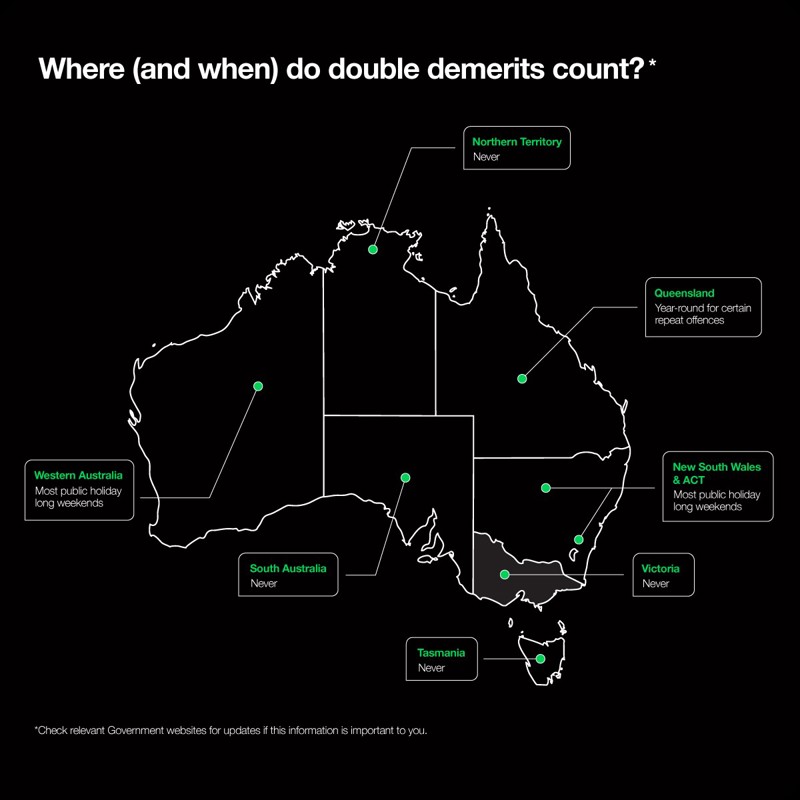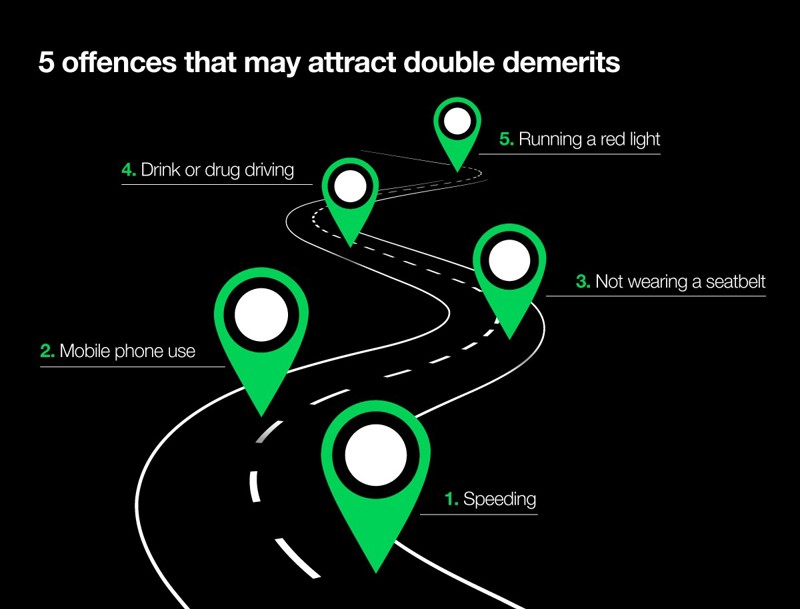Aussies love a long weekend or holiday season road trip complete with delicious snacks, a classic driving playlist and no chance of hearing from the boss! But did you know that, in parts of the country, seasonal double demerits mean penalties for single offences could lead to you losing your driver’s licence on the spot?
In Australia, being caught for a traffic offence – such as speeding or not wearing a seatbelt – will result in a fine and usually a specified number of demerit points being applied to your licence. If you accrue 12 or more points – 13 in New South Wales – in any three-year period on an open driver’s licence (also known as a full or unrestricted licence), you could face your licence being suspended.1
In some parts of the country, these points are doubled – called ‘double demerits’ – during holiday periods. Depending on your state or territory, these double demerits dates might include the Christmas/Boxing Day holiday period, the Easter long weekend, and certain other long weekends such as Anzac Day. This means an offence that might normally attract six demerit points would instead attract 12 points, which could result in the immediate loss of your licence.
It’s possible that double demerits could also result in higher car insurance premiums. So asking yourself, “Are there double demerits today?” before you hit the road, could spell the difference between a road trip to remember and one that you’d rather forget.
In this article, we’ll break down exactly how the double demerits system works across Australia, including what offences they apply to, when they come into effect and how you can avoid them.
What are the double demerits dates?
If you’re driving over a long weekend in New South Wales, Western Australia or the Australian Capital Territory, keep in mind that double demerits will most likely apply.2, 3, 4
While the exact dates vary between states and territories, public holidays and long weekends are well known for double demerits “blitzes” – especially over the Easter long weekend and during the Christmas and New Year period.
If you live in Queensland though, it doesn’t need to be a public holiday for double demerits to apply – the Sunshine State uses the double demerit system year-round for drivers who repeat certain offences – such as speeding more than 20km/h over the limit or using your mobile phone while driving – within one year of the previous offence.5
New South Wales introduced double demerits in 1997.6 As of June 2025, South Australia, Tasmania, Victoria and the Northern Territory do not apply double demerits at any time of the year.

Double demerits: NSW
Currently, double demerits come into play during six holiday periods in New South Wales throughout the year. Keep in mind that NSW Police enforce these sanctions for the whole long weekend, not just on the public holiday itself:
- Australia Day
- Easter long weekend
- Anzac Day
- King’s Birthday
- Labour Day
- Christmas-New Year period, including Boxing Day2
The double demerits scheme applies for driving offences related to:
- driving over the speed limit
- illegal use of mobile phones
- not wearing a seatbelt
- riding without a helmet2
Here are all the traffic offences that incur demerit points in NSW.7
Demerit point relief for safe drivers in NSW
It’s worth noting that, currently, NSW drivers who maintain a clean driving record for 12 months may be eligible to have a demerit point wiped from their licence, under a NSW Government initiative to incentivise safe driving.8 First introduced in January 2023, the scheme has been extended until 31 January 2026, and is open to all eligible unrestricted and professional licence holders with active demerit points.1
“People are used to the stick of enforcement and double demerits, but this is the carrot of reward for good behaviour,” said John Graham, NSW Minister for Transport.
Double demerits: WA
During holiday periods and long weekends in Western Australia, the following driving offences are subject to double demerits:3
- Driving over the speed limit
- Drink or drug driving
- Failing to wear a seatbelt and child restraint
- Running a red light
- Illegal use of a mobile phone while driving
- Driving a motor vehicle fitted with a device designed to evade detection by a speed camera (14 points during double demerits period)
- Driving a motor vehicle in a manner to evade detection by a speed camera (14 points during double demerits period)3
Here are all the traffic offences that incur demerit points in WA.9
Double demerits: QLD
In Queensland, double demerits points apply all year round for certain repeat offences committed within 12 months of the previous offence – this includes mobile phone, seatbelt, driving more than 20km over the speed limit and motorcycle helmet offences.5
It’s also worth noting, a motorist doesn’t have to commit the exact same offence a second or subsequent time to receive double demerits – the offence only needs to be within the same group of driving offences.5
Here are all the traffic offences that incur demerit points in Qld.10
Double demerits: VIC
Double demerits don’t currently apply in Victoria at any time of year, and that includes public holidays and long weekends.
Here are all traffic offences that incur demerit points in Vic.11
Double demerits: ACT
In the Australian Capital Territory, double demerits are enforced during public holiday periods and apply to driving over the speed limit, illegal mobile phone usage, not wearing a seatbelt and riding a motorcycle without a helmet.4
Here are all the traffic offences that incur demerit points in the ACT.12
Double demerits: SA
South Australia is another state that does not currently impose double demerits on drivers during Christmas, the Easter long weekend, or at any time of year, including public holidays.13
Here are all the traffic offences that incur demerit points in SA.13
Double demerits: TAS
Tasmanian drivers are also not currently subject to double demerits at any time of year, including public holidays.14
Here are all the traffic offences that incur demerit points in Tas.14
Double demerits: NT
The Northern Territory does not currently use double demerits at any time of year, including public holidays.15
Here are all the traffic offences that incur demerit points in the NT.15
What if I’m caught committing a driving offence interstate?
Queensland drivers might be in for a nasty surprise if they get caught breaking the speed limit in another state or territory – they might still get double demerits applied thanks to “home state rules”.10
Under these rules, a Queensland driver who commits a demerit-point offence anywhere in Australia may be treated as if the offence was committed in Queensland. This means, if it is a repeat offence, double demerits could apply – even if the state or territory you’re caught in doesn’t use the double demerits system.10
If you’re a NSW driver caught committing driving offences interstate, the number of demerit points that a particular offence attracts in NSW – including double demerits – may still be applied to your licence.1
If you’re travelling interstate and you’re unsure, check the rules with your local state or territory government. You should also be able to check your demerit points status on your relevant state or territory government website – for instance, Service NSW in New South Wales and VicRoads in Victoria.16, 17
What offences attract double demerit points?
In general, the offences that can attract double demerit points are speeding, mobile phone usage, not wearing a seatbelt, and not wearing a helmet when riding a motorcycle.
However, these vary from state to state and, in WA, double demerits also apply for other offences, including drink driving, running a red light, driving a motor vehicle fitted with a device designed to evade detection by a speed camera and driving a motor vehicle in a manner to evade detection by a speed camera.3
According to Queensland’s Department of Transport and Main Roads (DTMR), speeding is one of the more common driving offences. A recent Department of Transport and Main Roads (DTMR) survey found that more than half of all drivers speed on a regular basis – at least 50% of the time.18

How can I avoid double demerits?
Put simply – if you follow the road rules, you shouldn’t have any cause to worry.
A lot of newer car models also include features that can help you to avoid breaking road rules. For instance, Intelligent Speed Adaptation (ISA) uses navigation systems such as GPS to link to speed zone databases. This allows the car to “know” where it is, and the speed limit on that road, to help its driver stick to the speed limit.19
It’s common sense to take extra care on the road during holiday periods when more people are travelling, and to try to be patient with your fellow motorists.
Do double demerits make our roads safer?
The threat of double demerits might make the ordinary motorist think twice about speeding during holiday periods, but they’re less effective in changing long-term behaviours, according to a spokesperson for Queensland’s Department of Transport and Main Roads.
“There is no proven safety or deterrent benefit for enforcing double demerit points during holiday periods only,” the spokesperson says. “It’s more effective to enforce double demerit points for repeat offenders all year round as this directly addresses recidivist behaviour.”
Dr Brett Molesworth, a Professor in Human Factors and Aviation Safety at UNSW, says while short-term blitzes – such as double demerits during long weekends or extended holiday periods – might deter drivers from offences such as speeding or using their mobile phone while driving, the effect is generally only short-lived.
“It’s difficult to untangle the relationship between enforcement and double demerits (because) often accompanying double demerit point periods is increased enforcement,” says Molesworth.
“Double demerit points are only possible with enforcement, and visible enforcement is most effective when applied consistently. But this is often not possible due to financial constraints. While cost effective, the true effect of an enforcement blitz is often reflective of the strategy, (and) behavioural change is typically only short term.”
While you’re out on the road during holiday periods, keep this information in mind to hopefully avoid any fines or double demerits. If you’re looking for options to keep your vehicle covered, consider Youi car insurance to see if it’s right for you.
Note: Information in this article is relevant as of June 2025 and by its nature will change over time. Check relevant Government websites for updates if this information is important to you.
1 Source: NSW Government – How demerit points work
2 Source: NSW Government – Demerit points
3 Source: WA Government – Double demerits
4 Source: ACT Government – Road Transport (Offences) Amendment Regulation 2018 (No 1)
5 Source: Qld Government – Double demerit points
6 Source: Moree Plains Shire Council – Double Demerit Points
7 Source: NSW Government – Search offences and penalties
8 Source: NSW Government – Make it the season to drive safely as 1.1 million close in on demerit point back, December 2024
9 Source: WA Government – Road rules and safety
10 Source: Qld Government – Demerit points schedule
11 Source: Vic Government – Demerit points
12 Source: ACT Government – Demerit points and suspensions
13 Source: SA Government – Check your demerit points
14 Source: Tas Government – Find a traffic offence
15 Source: NT Government – Traffic offence fines and demerit points
16 Source: NSW Government – Check your demerit points
17 Source: Vic Government – Check your demerit points and driver history
18 Source: Qld Government – Media Statement: Queenslanders urged to drive safely and slow down this Easter, April 2025
19 Source: NSW Government – Road Safety Technology





